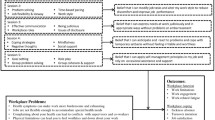Abstract
Training effectiveness is often reduced because trainees are unable to deal with work environment and interpersonal constraints. Incorporating relapse prevention strategies into training programs has been suggested as a method to increase training effectiveness. This study evaluates the impact of including a relapse prevention component in a supervisory skills training program. The results suggest that relapse prevention strategies may be valuable for increasing trainees' awareness of situations where new skill usage is relevant and facilitating managers' involvement in the development of new skills.
Similar content being viewed by others
References
Baldwin, T. T. & Ford, J. K. (1988). Transfer of training: A review and directions for future research.Personnel Psychology, 41, 63–106.
Bandura, A. (1977).Social Learning Theory, Englewood Cliffs, NJ: Prentice-Hall.
Chaney, E. F., O'Leary, M. R. & Marlatt, G. A. (1978). Skill training with alcoholics.Journal of Consulting and Clinical Psychology, 46, 1092–1104.
Gagne, R. M. (1984). Learning outcomes and their effects—Useful categories of human performance.American Psychologist, 39, 377–385.
Georgenson, D. L. (1982) The problem of transfer calls for partnership.Training & Development Journal, 36 (10), 75–78.
Marlatt, G. A. & Gordon, J. R. (1980). Determinants of relapse: Implications for the maintenance of behavior change. In P. O. Davidson & S. M. Davidson (Eds.),Behavioral Medicine: Changing Health Lifestyles, (pp. 410–452), Elmsford, NY: Pergamon.
Marx, R. D. (1982). Relapse prevention for managerial training: A model for maintenance of behavior change.Academy of Management Review, 7, 433–441.
Marx, R. D. (1985a). Improving management development through relapse prevention strategies.Journal of Management Development, 5 (2), 27–40.
Marx, R. D. (1985b). Relapse prevention strategies: A self-management program for on-the-job skill retention. Available from Robert Marx, University of Massachusetts.
Marx, R. D. (1986). Self-managed skill retention.Training & Development Journal, January, 54–57.
Noe, R. A., (1986). Trainees' attributes and attitudes: Neglected influences on training effectiveness.Academy of Management Review, 11, 736–749.
Noe, R. A. & Schmitt, N. (1986). The influence of trainee attitudes on training effectiveness: Test of a model.Personnel Psychology, 39, 497–523.
Perri, M. G., Shapiro, R. M., Ludwig, W. W., Twentyman, C. J., & McAdoo, W. G. (1984) Maintenance strategies for the treatment of obesity: An evaluation of relapse prevention training and post-treatment contact by mail and telephone.Journal of Consulting and Clinical Psychology, 52, 404–413.
Peters, L. H. & O'Connor, E. J. (1980). Situational constraints and work outcomes: The influence of a frequently overlooked construct.Academy of Management Review, 5, 391–397.
Russell, J. S., Terborg, J. R., & Powers, M. L. (1985). Organizational performance and organizational level training and support.Personnel Psychology, 38, 849–863.
Wexley, K. N. & Baldwin, T. T. (1986). Post-training strategies for facilitating positive transfer: An empirical exploration.Academy of Management Journal, 29, 503–520.
Wexley, K. N. & Latham, G. P. (1981).Developing and Training Human Resources in Organizations. Glenview, IL: Scott, Foresman.
Author information
Authors and Affiliations
Rights and permissions
About this article
Cite this article
Noe, R.A., Sears, J. & Fullenkamp, A.M. Relapse training: Does it influence trainees' post training behavior and cognitive strategies?. J Bus Psychol 4, 317–328 (1990). https://doi.org/10.1007/BF01125242
Issue Date:
DOI: https://doi.org/10.1007/BF01125242




